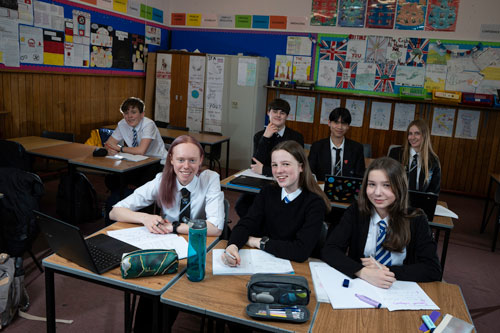Science helps our understanding of the world around us. Everything we know about the universe, from how plant growth may be increased to feed a growing population to what an atom is made up of, is the result of scientific research and experiment. It is also one of the fundamental parts of the term STEM, used to refer to science, technology, engineering and mathematics.
Human progress throughout history has largely rested on advances in science. From our knowledge of gravity to cutting-edge medicines and the invention of the mobile phone, students of Science have shaped our modern world. Young scientists ensure the next wave of progress in all of the fields that affect our daily lives.
What skills can be developed?
The aim of the Science Department at Penicuik High school is to encourage curiosity and enthusiasm for discovery in our students challenging them to become problem solving, critical thinkers.
Our young scientists develop their scientific analytical thinking, inquiry and investigative skills including the ability to collaborate with others through the design and implementation of scientific investigations. We encourage them to become scientifically literate citizens able to expresses informed views of scientific issues. We build their understanding of the connections between science and their own health and wellbeing and an awareness of their own impact on the world.
Potential careers related to your subject
Science provides skills needed in many areas including engineering, health, beauty, food technology, manufacturing and construction. Many of the highest paid careers such as medical practitioners, pilots and flight engineers require science qualifications.
Broad General Education (BGE)
In S1 and 2- Pupils come to Science for three Periods per week. All pupils study an integrated science course written in line with the new Curriculum for Excellence Science Benchmarks which covers an introduction to science equipment, measurement and data handling, followed thereafter by a rotation of 4 science topics in each year.
Topics studied are Biological Systems, Materials, Electricity and Planet Earth. Pupils are supplied with fill in booklets including learning outcomes for each topic and these may be used in preparation for tests.
In S3 Pupils pick one or two of the discrete sciences and progress through Level 4 outcomes toward the N4/ 5 courses to be assessed in S4.
Assessment information
At BGE science is assessed through end of unit tests at the end of each topic (preparing them for the retention of information required in the senior phase) combined with experimental write ups and short research reports.
S3 and 4 Environmental Science
For pupils who have not yet attained Level three in Science by the end of S2 the S3/4 Environmental Science Course encourages the development of skills and resourcefulness, which lead to becoming a confident individual. Successful learners in environmental science think creatively, analyse and solve problems. Environmental science aims to produce responsible citizens, through studying relevant areas such as the living environment, the Earth’s resources and sustainability. Learners will be able to develop their communication and collaborative working skills.
Environmental science is an inter-disciplinary subject, which draws from the sciences and social sciences. The Course is practical and experiential and develops scientific awareness of environmental issues. Environmental scientists are involved in tackling issues such as global climate change, pollution, use of land and water resources and changes in wildlife habitats.
Pupils study three units throughout the course:
Living Environment: interdependence; adaptation for survival; the impact of population growth and natural hazards on biodiversity; and the nitrogen cycle and the environmental impact of fertilisers.
Earth’s Resources: the responsible use and conservation of non-renewable and renewable resources; the formation and use of fossil fuels; the derivation and uses of materials derived from crude oil; the risks and benefits of different energy sources, including those produced from plants; the carbon cycle and processes involved in maintaining the balance of gases in the air, and the causes and implications of changes in the balance.
Sustainability: the sustainability of key natural resources and possible implications for human activity; the interaction between humans and the environment and the impact of human activity on an area; the role of agriculture in the production of food and raw material and its environmental impacts and sustainability; society’s energy needs and the impact of developments in transport infrastructure in a selected area; and development of sustainable systems.
Assessment for National 4 Environmental Science
Several internally assessed components build up the portfolio for a pass at N4- an investigation write up, three end of unit tests and an Added Value Unit (Research Report). These build up into a folder of evidence that may be submitted for verification to SQA.
Progression
N4 Environmental Science provides a good base for progression to N5 Sciences in S5.
Extracurricular opportunities
In first year our S6 Scientists run Science club for the incoming S1. In the senior years our scientists are encouraged to apply for the Nuffield Award Scheme and Strathclyde University’s Space School.
Trips
S1 and S2 Scientists take part in the Midlothian Science Festival during the first week of October every year. They are visited by Scientists from the Roslin Institute, University of Edinburgh and other research establishments and gain an insight into scientific research. In late February before they make their course choices S2 visit the STEM HIVE a Science careers showcase held at the National Museum of Scotland. Small teams of Penicuik Scientists also take part in opportunities such as Project Dragonfly (Heriot Watt University) and the Faraday Challenge.
Members of the Science Department
Alison MacFadyen (Science, Biology and Physics) – Principal Teacher Curriculum
Kirsty Maden (Science and Biology) NQT
Kara MacFadyen (Science and Biology) NQT
Ellie Campbell (Science and Chemistry)
Alistair Proctor (Science and Chemistry)
Cathie Redford (Science and Physics)
Sam Preedy (Science and Physics)
